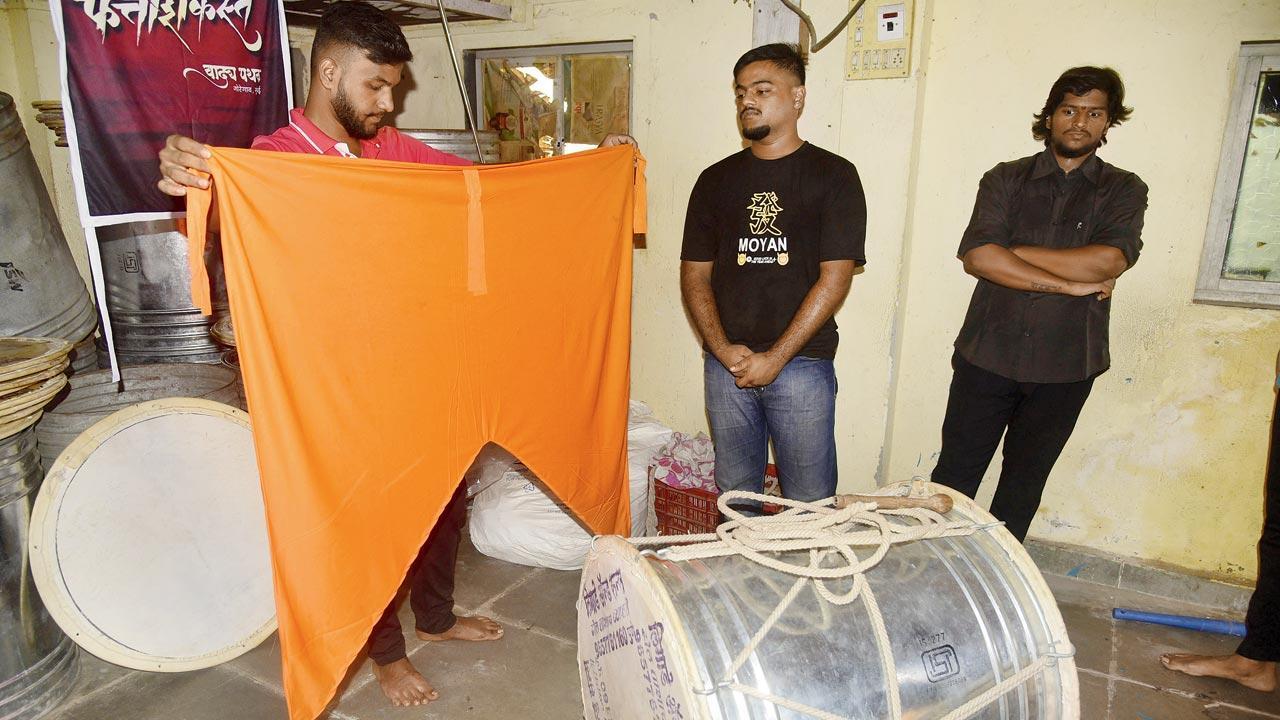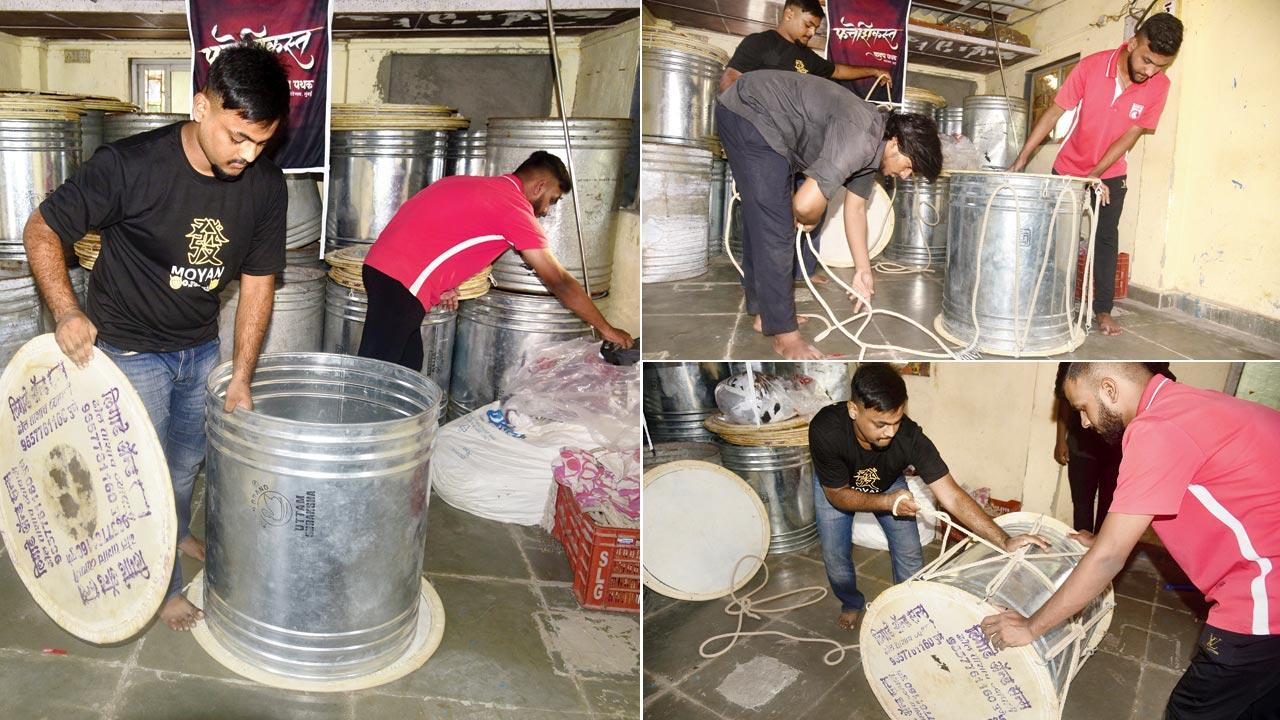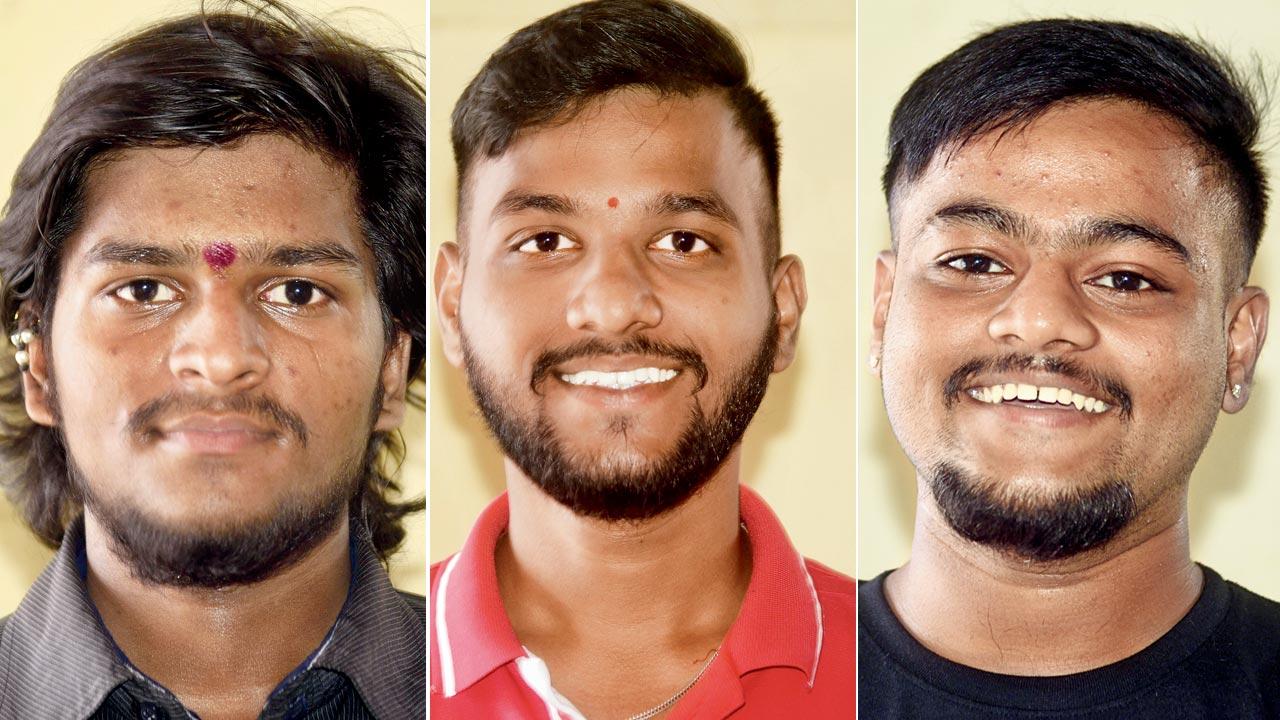A road accident tragedy hasn’t managed to rob Goregaon’s Dhol Tasha Pathak of its spunk. Sunday mid-day spends an evening with the boys to talk lost friendships and legacy

The Bajiprabhu Dhol Tasha Pathak, started in 2022, lost 15 of its members, including its founder, in April this year. Now relaunched with the name Fatteshikast, the Pathak aims to keep the legacy of their lost brethren alive. Pics/Atul Kamble
A hollow drum, around two feet in length, is laid out on the floor. Called a taaki in Marathi, its hollow ends are covered with a circular canvas or paan on each side and secured with a thick length of rope. Once the young men assembling it are convinced that the rope is tied firmly, using all their body strength to yank it in place, one of them picks up a short wooden rod, called tipur, and hits it gently on one side.
ADVERTISEMENT
This side, where the tipur hits, is called the thoka, while the other, which is hit by the hand, is called the thaap. The dhol or double-headed drum is ready.
For the members of the Fatteshikast Dhol Tasha Pathak, this process is more symbolic than literal. The merry band of 18- to 20-year-olds has just begun putting together the pieces of a large part of their lives, scattered by tragedy earlier this year.
The Pathak debuted in 2022 under a different name—Bajiprabhu Dhol Tasha Pathak. It was the brainchild of 22-year-old Satish Dhumal, a dhol player who started his own group and brought together 40 dhol tasha enthusiasts from Goregaon and nearby suburbs. For a year, the Pathak toured the city, playing at major festivals including Ganeshotsav and Navratri celebrations.
 Fatteshikast members fasten canvas circles, called paans, on both sides of the dhol’s hollow, known as taaki, with thick rope. One side, which is played with a wooden rod called tipur, is known as the thoka, while the other side, played with the palm of the hand, is called thaap
Fatteshikast members fasten canvas circles, called paans, on both sides of the dhol’s hollow, known as taaki, with thick rope. One side, which is played with a wooden rod called tipur, is known as the thoka, while the other side, played with the palm of the hand, is called thaap
In April this year, they got their first opportunity to play outside Mumbai, at an Ambedkar Jayanti celebration in Pune.
“We actually had two offers,” recalls Kartik Barot, Dhumal’s old friend and fellow dhol player. “One was in Khar; the other in Pune. We opted for the latter because it was a great break for us. We had a fantastic evening and set out to return home in the early hours of the morning. Most of us were sleeping on our way back.”
At 3.30 am that April 15 night, the private bus carrying 42 members of the group plunged into a ravine off Borghat on the Mumbai Pune Highway. Dhumal, who was seated beside the driver, lost his life along with 15 others. The youngest member of the group to die that morning, Veer Mandavkar, was nine.
 Kartik Barot, Roshan Shelar and Om Kadam
Kartik Barot, Roshan Shelar and Om Kadam
Those who survived suffered staggering injuries. Some had to undergo multiple surgeries and resort to months of bed rest. As life limped back to normal, Barot decided he was going to keep the legacy of their lost comrades alive. “Three months ago, we got together,” says Roshan Shelar, the scars still visible on his feet. “Dhumal’s mother had only one request, that we not retain the original name of the Pathak; it was a painful reminder of her loss. We agreed on Fatteshikast, the name given to Chhatrapati Shivaji Maharaj’s historic victory over Shaistekhan and his army.”
The newly formed Pathak met mid-day at a godown on the first floor of a modest structure in Jai Bhim Nagar, Goregaon East. The godown is accessed via a steep external metal staircase, and most of the space is taken up by the dhols, dismantled and neatly stacked up.
“Everyone opened their hearts to us,” recalls Om Kadam. “We got 21 dhols from a Pathak in Palghar, 10 from a Pathak in Mumbai and R1 lakh from a Pune-based group, which we used for the treatment of the injured. We got back to practicing and had a grand opening at the Maasaheb Meentai Thackeray Udyan in Tardeo.”
The Pathak, which now has 60 members, are working to carry on the shared dream, while passing on the knowledge to the younger generation. They gather every Sunday morning at an open space in the industrial area in Goregaon West to practice; they say they are already inundated with offers.
“There is no formal training for this art,” says Barot, who has now assumed the role of leader or Pathak Pramukh. “The newbies are taught by the veterans, and allowed to play at events once ready. There is no criteria except a willingness to learn and the commitment to take the tradition forward. Anyone can join; you can’t put an age limit to art.”
The young players, though, have learned their lesson. They won’t allow minors to play at events. “It is a responsibility and a big one. Veer’s death was hard for us. Children can come and learn with us, but only those aged 18 and above are allowed to play at events,” says Shelar as we make our way gingerly down the precarious staircase. Kadam watches our hesitation and laughs, “We run up and down these, massive drums in hand.”
The age-old drum circle
Maharashtra’s dhol-tasha tradition is an instrumental art form associated with festive and religious celebrations, and rural village fairs or jatra. Its origins, some accounts say, lie in military tradition, with the drums used to stir up courage and determination in the soldiers. It is VV Appaji Pendse who is credited with retaining the folk art in Maharashtra. Inclusive in character, dhol-tasha groups include women and members of other faiths. Pune and Nashik are believed to have the best talent.
 Subscribe today by clicking the link and stay updated with the latest news!" Click here!
Subscribe today by clicking the link and stay updated with the latest news!" Click here!







